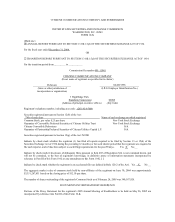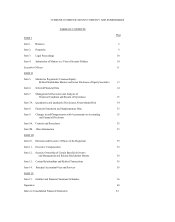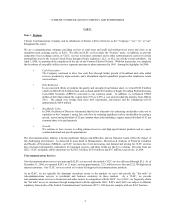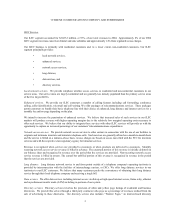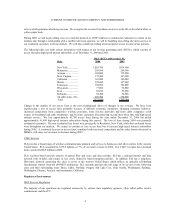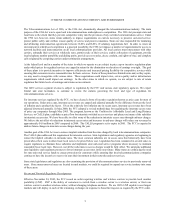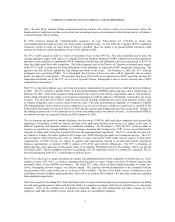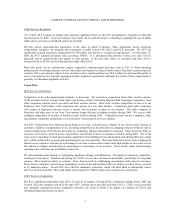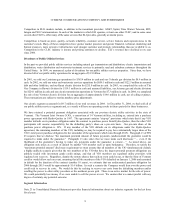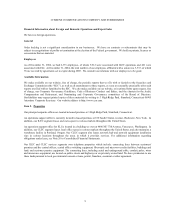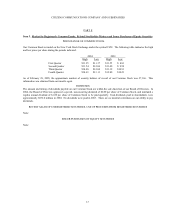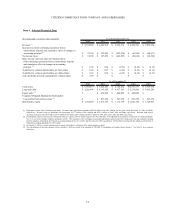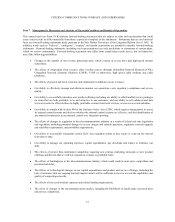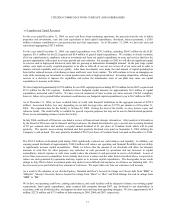Frontier Communications 2004 Annual Report Download - page 9
Download and view the complete annual report
Please find page 9 of the 2004 Frontier Communications annual report below. You can navigate through the pages in the report by either clicking on the pages listed below, or by using the keyword search tool below to find specific information within the annual report.
CITIZENS COMMUNICATIONS COMPANY AND SUBSIDIARIES
7
CLEC Services Regulation
As a CLEC, ELI is subject to federal, state and local regulation. However, the level of regulation is typically less than that
experienced by an ILEC. Local governments may require ELI to obtain licenses or franchises regulating the use of public
rights-of-way necessary to install and operate its networks.
ELI has various interconnection agreements in the states in which it operates. These agreements govern reciprocal
compensation relating to the transport and termination of traffic between the ILEC's and ELI's networks. The FCC has
significantly reduced intercarrier compensation for ISP traffic, also known as “reciprocal compensation.” On December 15,
2004, the FCC adopted permanent rules governing UNEPs. It is anticipated that portions of these new rules will be
appealed, and we cannot predict the impact of such appeals. If the rules take effect, we anticipate that there will be
increased costs to ELI for services that they buy today from ILECs.
Most state public service commissions require competitive communications providers, such as ELI, to obtain operating
authority prior to initiating intrastate services. Most states also require the filing of tariffs or price lists and/or customer-specific
contracts. ELI is not currently subject to rate-of-return or price regulation. However, ELI is subject to state-specific quality of
service, universal service, periodic reporting and other regulatory requirements, although the extent of these requirements is
generally less than those applicable to ILECs.
Competition
ILEC Services Competition
Competition in the telecommunications industry is increasing. We experience competition from other wireline carriers,
VOIP providers such as Vonage, from other long distance carriers (including Regional Bell Operating Companies), from
cable companies, internet service providers and from wireless carriers. Most of the wireline competition we face is in our
Rochester, New York market, with competition also present in a few other markets. Competition from cable companies
with respect to high-speed internet access is intense and increasing in many of our markets. The cable company in
Rochester and other parts of our New York markets began offering a telephony product during 2004. We expect cable
telephony competition to increase in Rochester and elsewhere during 2005. Competition from wireless companies, other
long distance companies and internet service providers is increasing in all of our markets.
Our ILEC business has been experiencing declining access lines, switched access minutes of use, and revenues because of
economic conditions, unemployment levels, increasing competition (as described above), changing consumer behavior such as
wireless displacement of wireline use and email use, technology changes and regulatory constraints. These factors are likely to
cause our local service, network access, long distance and subsidy revenues to continue to decline during 2005. One of the
ways we are responding to actual and potential competition is by bundling services and products and offering them for a single
price, which results in lower pricing than purchasing the services separately. Revenues from data services such as high-speed
internet access continue to increase as a percentage of our total revenues and revenues from high margin services such as local
line and access charges and subsidies are decreasing as a percentage of our revenues. These factors, along with increasing
operating costs, will cause our profitability to decrease.
The telecommunications industry is undergoing significant changes and difficulties. The market is extremely competitive,
resulting in lower prices. Demand and pricing for CLEC services have decreased substantially, particularly for long-haul
services. These trends are likely to continue. These factors result in a challenging environment with respect to revenues.
These factors could also result in more bankruptcies in the sector and therefore affect our ability to collect money owed to
us by bankrupt carriers. Several IXCs have filed for bankruptcy protection, which will allow them to substantially reduce
their cost structure and debt. This could enable such companies to further reduce prices and increase competition.
CLEC Services Competition
ELI faces significant competition from ILECs in each of its markets. Principal ILEC competitors include Qwest, SBC and
Verizon. ELI also competes with all of the major IXCs, internet access providers and other CLECs. CLEC service providers
have generally encountered intense competitive pressures, the result of which is the failure of a number of CLECs and
substantial financial pressures on others.

